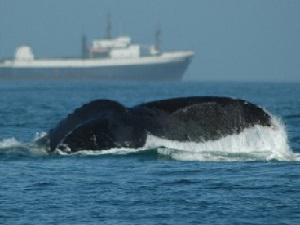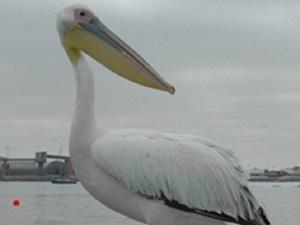Ruth Leeney
Other projects
19 Sep 2013
Are Endangered Sawfish Still Present in Mozambique? A Baseline Ethno-Ecological Survey
The aim of the project is to provide a course specifically aimed at tour operators in the Walvis Bay region, to educate them on the ecology of the species they encounter and how to interact safely and sustainably with them.

Humpback whales are often sighted in Walvis Bay and are one of the focuses of the marine tourism industry. © Ruth Leeney.
Namibian coastal waters are rich in marine biodiversity, including many marine mammals and sea birds. In Walvis Bay, a tourism industry benefitting from this extraordinary wildlife has developed. A training course has been developed on the back of three years of research on the cetaceans in Walvis Bay and observations of the marine tourism industry in the region. This industry is expanding and is currently unregulated, and both the research team (the Namibian Dolphin Project) and several tour operators have expressed concerns that the activities of tour boats may be unsustainable and may soon threaten the marine wildlife and thus the industry itself.

Walvis Bay is host to a diversity of bird life, such as pelicans, which draws many visitors to the area. © Ruth Leeney.
The course will be held in February 2012, in Walvis Bay, Namibia. The course will provide a background to skippers and crew on marine wildlife-watching boats, and to other staff working for these companies, on the basic biology and ecology of the species they encounter, the behaviours of these species and how to interpret them, the potential for negative impacts of tour boat activities on the wildlife and the ways by which they can prevent negative impacts. The course will in particular focus on cetaceans (whales and dolphins), seals and seabirds but will also cover other species. The course will also explore the potential for providing education to the tourists on board these trips, and will collect the opinions of course participants on useful educational materials that could be developed.
The course has been discussed with the locally-based Marine Tourism Association Network (MTAN) in Walvis Bay and will also involve government officials from the Namibian Ministry of Fisheries and Marine Resources and the Ministry of Environment and Tourism. In this way, it is hoped that the course will provide the starting point for a series of discussions towards developing legislation and guidelines in Namibia to promote and support responsible marine tourism.
By creating a certification scheme around this course, we hope to raise the overall standard of operation within the industry and create awareness among tourists, which will further encourage this standard to be upheld by the tour operators, not only in Namibia but worldwide. Ultimately, we hope to conserve Namibia’s marine wildlife and educate both locals and visitors about the importance of respecting marine ecosystems, thus ensuring the longevity of the local tourism activities.